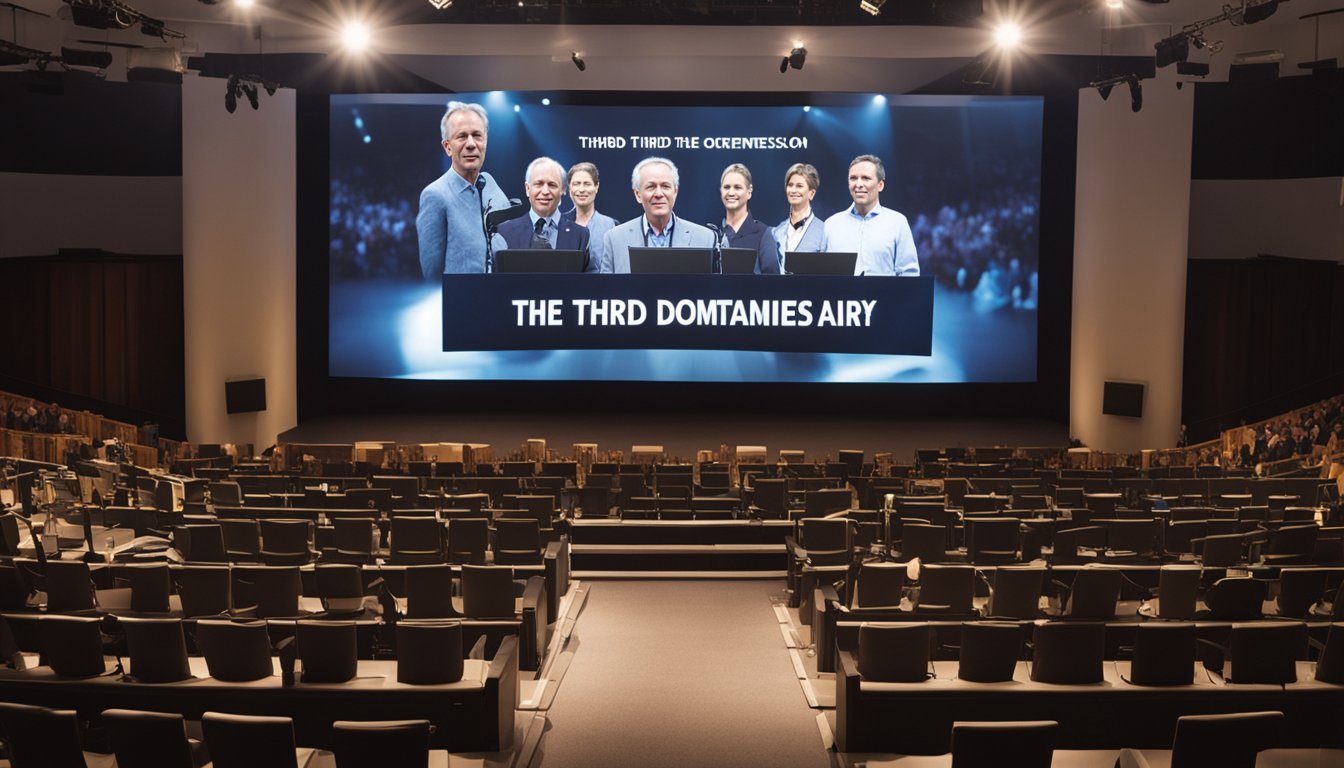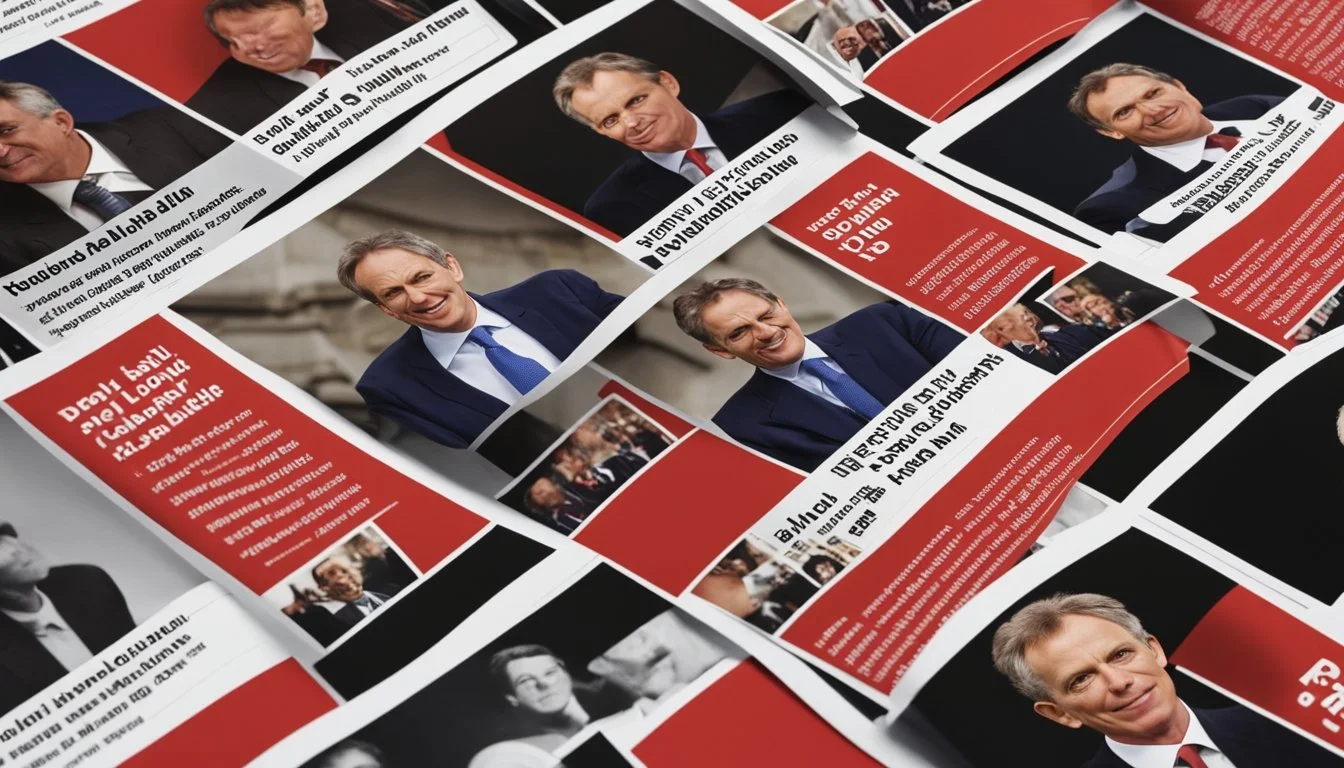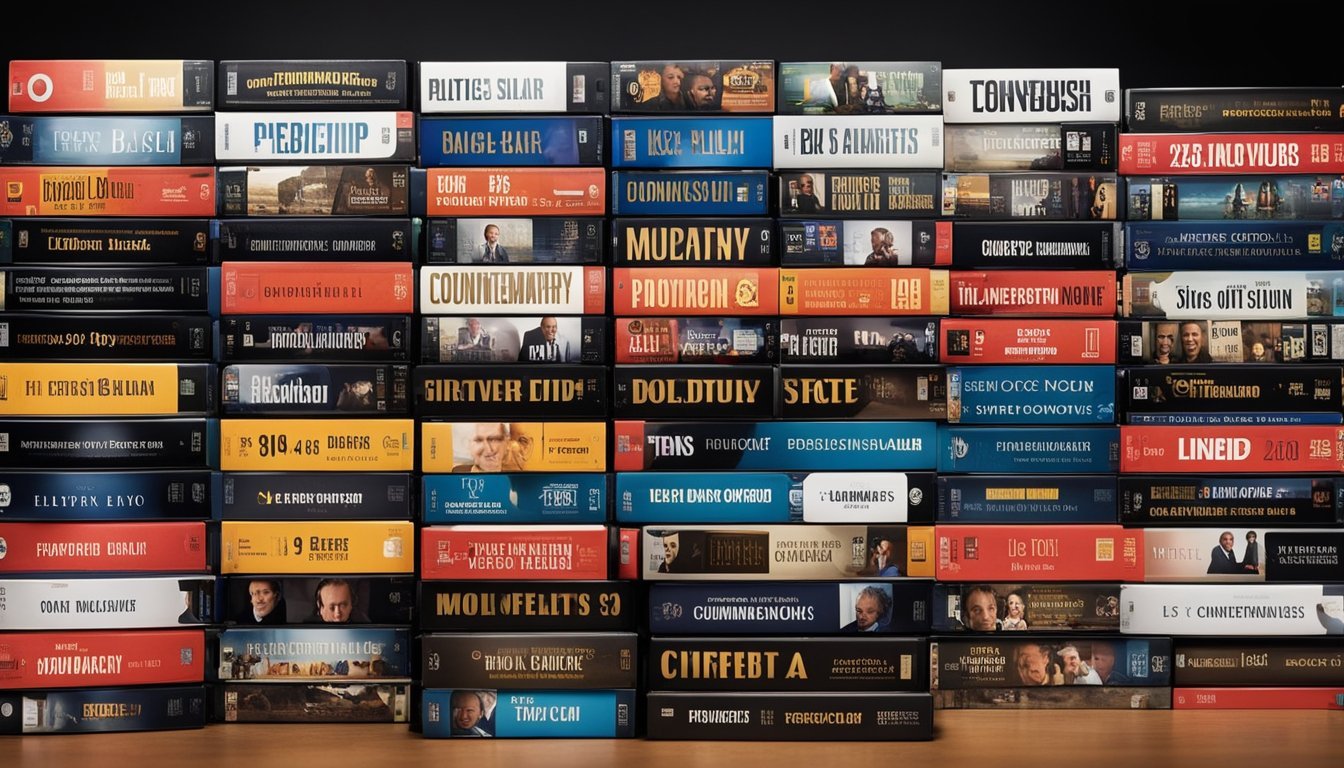14 Documentaries on the Controversial Premiership of Tony Blair
A Critical Examination
Tony Blair's tenure as Prime Minister of the United Kingdom remains one of the most debated periods in recent British history. Serving from 1997 to 2007, his years in power were marked by significant political and social changes, both domestically and internationally. Documentaries exploring his time in office offer valuable insights into his policies, his leadership style, and the controversy that often surrounded his decisions.
For those seeking to gain a deeper understanding of Blair's complex legacy, these 14 documentaries provide a comprehensive look at his decade-long premiership. They cover a range of topics from his initial rise to power, his role in significant global events, to the lasting impact he has made on British and world politics. This collection highlights both the achievements and challenges Blair faced, presenting a balanced perspective on his leadership.
1) The Blair Decade (2007)
"The Blair Decade" provides a comprehensive look at Tony Blair’s time in office, capturing the highs and lows of his political career. The documentary highlights Blair's significant impact on the United Kingdom’s domestic and foreign policies.
Blair’s tenure saw substantial changes in public services. He pushed for reforms in education and healthcare. His government introduced measures like tuition fees for university students, aiming to improve higher education quality.
Internationally, Blair is remembered for his close alliance with the United States. His decision to support the Iraq War remains highly controversial. The documentary delves into this period, examining Blair's reasoning and its lasting implications.
The production also covers Blair's role in the Northern Ireland peace process. His efforts culminated in the signing of the Good Friday Agreement, which was a major step towards peace in the region.
Blair's leadership style, communication skills, and public relations strategies are also explored. The film underscores how his charisma and political acumen helped navigate numerous challenges during his premiership.
"The Blair Decade" stands as a definitive documentary for those interested in contemporary British history and the intricacies of Blair's leadership. More information on IMDb
2) New Labour's Legacy
New Labour, under Tony Blair, redefined the Labour Party and British politics.
The movement focused on modernizing the party, emphasizing a "Third Way" that combined left-wing social policies with right-wing economic strategies. This approach led to significant electoral success, with Labour winning three consecutive general elections.
One of New Labour's notable achievements was the introduction of the National Minimum Wage, which aimed to reduce poverty and inequality. They also implemented extensive public service reforms in areas like healthcare and education, leading to increased funding and the introduction of performance targets.
Despite these successes, New Labour faced criticism for its approach to foreign policy, particularly the decision to support the US-led invasion of Iraq in 2003. This decision remains a contentious aspect of Blair's legacy.
Key elements of New Labour's legacy include devolution, which granted Scotland, Wales, and Northern Ireland their own parliaments or assemblies, and civil rights advancements like the Human Rights Act 1998 and Civil Partnership Act 2004.
Blair's tenure saw economic growth and reduced unemployment, but also increased public sector debt and controversies surrounding spin and media manipulation. The movement's complex legacy continues to shape the Labour Party and British politics.
Blair & Brown: The New Labour Revolution (2021) - IMDB
3) The Iraq War Controversy
The Iraq War became one of the most disputed elements of Tony Blair's time as Prime Minister. The decision to join the U.S.-led coalition in 2003 faced significant opposition and remains a prominent topic of debate.
Blair's administration justified the invasion based on the alleged presence of weapons of mass destruction (WMDs) in Iraq. Subsequent investigations revealed no WMDs, which led to widespread criticism and questions about the integrity of the evidence presented.
Documents and testimonies later showed a lack of thorough discussion and planning before committing to the invasion. The Chilcot Inquiry, published in 2016, highlighted the failures in the decision-making process and the aftermath of the war.
Many documentaries have explored various aspects of the Iraq War and Blair's role in it. They capture the political and human consequences of the war.
No End in Sight (2007) - This film offers a detailed analysis of the Iraq War policy failures. IMDb
The Blair Years (2007) - A BBC production that explores Blair's time in office, including the Iraq War. IMDb
Why We Fight (2005) - Highlights the industrial and political factors leading to the Iraq invasion. IMDb
The War You Don’t See (2010) - Investigates media coverage of the Iraq War. IMDb
These documentaries provide varying perspectives on Blair’s policies and the extensive repercussions of the Iraq conflict.
4) A Journey: Tony Blair
"A Journey: Tony Blair" examines the autobiography of the former British Prime Minister, Tony Blair. Published in 2010, the memoir delves into Blair's tenure from 1994 to 2007, covering his leadership of the Labour Party and his time as Prime Minister.
The book sheds light on Blair's transformation of the Labour Party into "New Labour," marking a period of significant political change in the UK. It also discusses his notable policies and the challenges he faced while in office.
One focus of the memoir is Blair's controversial decisions regarding international interventions, including actions in Kosovo, Sierra Leone, Afghanistan, and Iraq. His belief in ethical intervention and political power is a recurring theme throughout the narrative.
Blair provides a candid and often wry perspective on his career, offering insights into his relationships with key political figures such as George W. Bush and Gordon Brown. The memoir reveals the complexities and pressures of political leadership during his premiership.
For further reading, visit Wikipedia or Penguin Random House.
5) The Third Way
The Third Way was a political ideology central to Tony Blair's approach during his time as Prime Minister. This centrist philosophy aimed to merge elements of both right-wing and left-wing policies.
Tony Blair and other leaders like Bill Clinton promoted the Third Way as a modernized form of social democracy. This approach sought to balance economic liberalism with social justice.
Anthony Giddens, a key influencer of Blair, played a significant role in shaping the Third Way. His works, including "The Third Way: The Renewal of Social Democracy" (1998), provided the intellectual foundation for this policy direction. More Information
6) Inside No. 10
"Inside No. 10" (2013) captures the tumultuous period of Tony Blair's leadership behind the closed doors of 10 Downing Street. The documentary provides a focused look at key decisions and events that marked his premiership.
This film includes interviews with Blair's closest aides and political analysts, offering valuable insights into his leadership style and strategies.
The documentary features rare behind-the-scenes footage and discussions about Blair's notable policies and international actions. It covers his handling of the Iraq War, his partnership with U.S. President George W. Bush, and his role in domestic reforms.
For more information: IMDb
7) When Tony Met Gordon
"When Tony Met Gordon" (2005) is a documentary that explores the intricate relationship between Tony Blair and Gordon Brown. The film delves into their partnership and rivalry, tracking their rise within the Labour Party.
The documentary provides insights into their collaboration in the mid-1990s. Blair and Brown's close relationship was pivotal in shaping New Labour's policies and strategies.
Through interviews and archival footage, the film showcases the tension and mutual dependence. Their bond was crucial in transforming Labour into an electable force.
For further details on "When Tony Met Gordon," visit the IMDb page.
8) Blair's People
"Blair: The Inside Story" (2007) sheds light on the key figures surrounding Tony Blair during his decade-long tenure as Prime Minister. Through interviews and insights, it showcases the crucial roles played by allies and advisors who influenced his decisions. More on IMDB.
"Blair & Brown: The New Labour Revolution" (2021) reveals the dynamics between Tony Blair and Gordon Brown, exploring how their relationship shaped Labour Party politics. This documentary offers a deep dive into their partnership and conflicts. More on IMDB.
"How Tony Blair Came to Be So Unpopular" (2023) examines the network of people and political moves that led to Blair's unpopularity. Interviews and archival footage provide a comprehensive view of the shifting public opinion during his leadership. More on BBC.
"The Killing$ of Tony Blair" (2016) includes perspectives from a variety of commentators and insiders. This film, narrated by George Galloway, critiques Blair's influence beyond his premiership, highlighting his impact on global politics. More on Wikipedia.
These documentaries collectively paint a picture of the people who were pivotal in Tony Blair’s political journey. They offer a balanced look, emphasizing both the positive contributions and controversies involving Blair's inner circle.
9) From Red to New Labour
This documentary, "Blair & Brown: The New Labour Revolution" (2021), offers an insightful examination of Tony Blair and Gordon Brown's transformation of the Labour Party.
Tony Blair and Gordon Brown, as young MPs, aimed to modernize a party burdened by economic issues and election failures. They pushed for substantial changes to reshape the Labour Party's identity and policies.
The film covers their journey in making Labour electable and winning three consecutive terms. It presents a detailed look at their political strategies and the internal dynamics of the party.
Viewers gain a behind-the-scenes look at the challenges faced and the decisions made, providing an intimate window into this significant political shift.
For more information: IMDB
10) Blair at War
Blair at War (2003) is an in-depth exploration of Tony Blair's role during the conflicts in Kosovo and Iraq. This documentary sheds light on his decisions, motivations, and the resulting implications for his premiership.
Blair's alliance with the United States, especially his support for the Iraq invasion, is a focal point. His navigation of international relations amid varying global perspectives, particularly with France and Germany, is examined.
This film includes insights from political analysts and key figures in Blair's administration. It provides a well-rounded view of the pressures and challenges faced by Blair during these significant wartime periods.
More about Blair at War on IMDb
11) Tony Blair: Behind Closed Doors
Released in 2012, "Tony Blair: Behind Closed Doors" explores the unseen and often contentious aspects of Blair's tenure as Prime Minister.
This documentary provides a unique perspective by featuring interviews with insiders who worked closely with Blair. Through their testimonies, viewers gain insights into the decision-making processes that defined his leadership.
The film delves into critical events such as the Iraq War, domestic policy changes, and political alliances. It captures the complexities and challenges that Blair faced while in power.
"Tony Blair: Behind Closed Doors" uses archival footage and exclusive interviews to present a nuanced portrayal of Blair's time in office. It encompasses both his strategic successes and contentious decisions.
The documentary is essential for those seeking to understand the intricate dynamics of Blair's premiership beyond public speeches and official statements.
For more information, see Tony Blair: Behind Closed Doors on IMDb.
12) Putting the Great Back into Britain
Tony Blair’s time as Prime Minister remains contentious, primarily due to his efforts to rejuvenate Britain's global standing.
His policies targeted modernization of public services and the economy. His government emphasized education, health, and technology as pillars for competition in the global market.
Blair's administration aimed at strengthening ties with key international allies. His foreign policy included active participation in global issues, notably his advocacy for interventions in Kosovo and Sierra Leone.
He also pushed for social policies aimed at increasing opportunity and reducing inequality. Blair's government introduced reforms in welfare and the labor market to support this vision.
The complexity of his domestic and foreign policies makes Blair a recurrent subject of documentaries. These films explore various facets of his leadership and the long-term effects of his premiership on Britain.
For more information on "The Killing$ of Tony Blair" (2016), visit Wikipedia.
For further details on "The Blair Decade," check out BBC News.
13) Tony Blair: Faith and Globalization
This documentary examines Tony Blair's involvement in faith and globalization after his political career. Tony Blair, the former Prime Minister of Britain, transitioned to teaching at Yale University following his departure from office in 2007.
At Yale, Blair co-taught a course titled "Faith and Globalization" with Professor Miroslav Volf during the 2008-09 academic year. The course aimed to explore the relationship between religion and global affairs, helping students understand the implications of faith in an increasingly interconnected world.
Blair's interest in the topic is further reflected by his establishment of the Tony Blair Faith Foundation in 2008. The foundation focuses on promoting interfaith dialogue and understanding to reduce conflicts fueled by religious differences.
This documentary provides insight into the intersection of Blair's political experience and his efforts to address global challenges through faith-based initiatives.
14) Blair vs. Brown: The Endgame
"Blair & Brown: The New Labour Revolution" provides an in-depth look at the dynamic and often tense relationship between Tony Blair and Gordon Brown.
This documentary covers their partnership, rivalry, and the crucial moments leading up to Blair's eventual resignation as Prime Minister, making way for Brown.
Released in 2021, it delves into the intricate politics of their tenure, the policies they championed, and the personal tensions that defined their time in office. The candid interviews with key political figures offer insights into how their relationship shaped the Labour Party and, ultimately, the UK government.
This documentary is a crucial watch for those interested in the political drama of New Labour's rise and the eventual transition of power from Blair to Brown.
For more information, you can visit its IMDB page.
Historical Context of Blair's Premiership
Tony Blair's tenure as Prime Minister came after a period of Conservative dominance and was marked by his leadership of the New Labour movement, which sought to modernize the Labour Party's approach.
Political Landscape Pre-Blair
The stage for Blair's leadership was set by nearly two decades of Conservative rule. From 1979 to 1997, the UK government was led by the Conservative Party, initially under Margaret Thatcher and later John Major.
The period was characterized by significant economic and social changes, including the privatization of state-owned industries and a reduction in the influence of trade unions.
By the early 1990s, the Conservatives faced growing unpopularity due to economic recession and various scandals, leading to a loss of public trust and setting the stage for Labour's resurgence.
Rise of New Labour
Under Tony Blair, the Labour Party underwent a significant transformation. Blair rebranded the party as New Labour, shifting its policies towards the political center to appeal to a broader electorate.
This included embracing market-oriented reforms and a commitment to improving public services while maintaining fiscal discipline.
This strategic shift helped Labour win a landslide victory in the 1997 general election, ending 18 years of Conservative government. Blair's leadership style and his vision for a "Third Way" in politics reflected a blend of traditional Labour values with a modern outlook on governance and economic management.
Major Policies and Decisions
Tony Blair's premiership involved significant economic reforms, transformations in the public sector, and pivotal foreign policy decisions, most notably surrounding the Iraq War.
Economic Reforms
Blair's tenure saw substantial changes in the economic landscape of the UK. One of the most notable measures was making the Bank of England independent in 1997. This move allowed the Bank to set interest rates without political interference, aiming to maintain economic stability and control inflation.
Another significant policy was the introduction of tuition fees for higher education, rationalized as a means to expand and better fund universities. Tax credits and welfare-to-work programs, part of Blair's "New Labour" ideology, sought to reduce unemployment and support low-income families.
Public Sector Changes
The public sector underwent extensive transformations under Blair's leadership. Education and healthcare received notable investments, leading to the modernization of schools and hospitals. Despite these improvements, Blair's introduction of tuition fees was a contentious topic.
Public services also saw an increase in private sector involvement, particularly through Public-Private Partnerships (PPPs). This approach aimed to leverage private investment for public projects, although it was criticized for potential long-term costs.
Devolution was another significant policy shift, granting Scotland, Wales, and Northern Ireland more self-governance. This move aimed to address regional demands and foster a more decentralized governance structure within the UK.
Foreign Policy and the Iraq War
Blair's foreign policy is most remembered for his decision to support the United States in the invasion of Iraq in 2003. This decision, based on the belief that Iraq possessed weapons of mass destruction, was highly controversial.
The Iraq War had profound implications, leading to a prolonged conflict and raising serious questions about intelligence and decision-making processes. Blair faced significant domestic and international criticism, impacting his reputation and legacy.
The Good Friday Agreement of 1998 marked another key foreign policy achievement, bringing significant progress towards peace in Northern Ireland. This agreement set a framework for devolution and laid the foundation for reducing sectarian violence in the region.
Public and Media Perception
Tony Blair's premiership was marked by significant public and media perception shifts. While some praised his policies and leadership, others criticized his actions, particularly in foreign policy matters.
Support and Criticism
Initially, Tony Blair enjoyed substantial support from both the public and the media. His leadership during the Labour Party's landslide victory in 1997 brought widespread optimism. Blair's modernization of the Labour Party, often termed "New Labour," and his focus on social and economic reforms received positive attention.
However, his decisions, especially the alliance with the United States in the Iraq War, led to severe criticism. The perceived lack of transparency and the controversial justification for the war resulted in declining approval ratings. Public sentiment was polarized, with media outlets reflecting this division in their coverage.
Blair's Legacy
Blair's legacy remains a topic of debate. On one hand, his tenure is credited with significant achievements like improved public services, economic growth, and social reforms. His role in the Northern Ireland peace process stands out as a notable accomplishment.
Conversely, his legacy is heavily tainted by the Iraq War. The conflict overshadowed many of his contributions and became a focal point for protest and dissatisfaction. Media portrayal of Blair shifted from admiration to intense scrutiny, affecting his long-term reputation.
Blair’s ability to maintain a strong global presence and his continued involvement in political discourse demonstrate the complexity of his legacy. The mixed reactions to his premiership highlight the enduring impact of his decisions on public perception.









